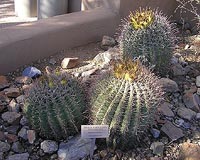 |
Washington (AFP) Nov 5, 2009 An international fisheries group set up to protect Atlantic tuna has done the opposite and driven one species of the fish, the bluefin, to the edge of extinction, environmentalists said Thursday. On the eve of a 10-day meeting in Brazil of the International Commission for the Conservation of Atlantic Tunas (ICCAT), environmentalists accused the group of ignoring the advice of its own scientists and setting fishing quotas for bluefin tuna that have drastically depleted stocks. "ICCAT has continually disregarded countless opportunities to do the right thing and secure the Atlantic bluefin tuna," Susan Lieberman, director of international policy at the Washington-based Pew Environment Group, told reporters. Marine biologist Carl Safina, president of the Blue Ocean Institute, which studies how human behavior impacts the ocean, called ICCAT "the poster child for not only failure... but cynicism and a real unwillingness to get serious, be professional and listen to what the science has to say. "The world's first fisheries management agency formed out of concern for this one species never followed their own science, never lived up to their mandate to manage for a sustainable yield," Safina said. ICCAT was set up in the late 1960s to conserve "tuna and tuna-like species in the Atlantic Ocean and adjacent seas," according to its website. Lieberman said ICCAT has for decades set quotas above what its own scientists have recommended for bluefin tuna. Those quotas are systematically exceeded by industrial fleets, which over-fish the species. Combined with illegal fishing, this has caused the population to decline by more than 85 percent in the eastern Atlantic and by more than 90 percent in the western Atlantic. "The bluefin tuna will not be with us and certainly will be extinct if governments don't do the right thing... and unless ICCAT says, 'Enough is enough, it's time for a zero quota; we're going to put the brakes on this fishery,'" Lieberman said. "If we had any terrestrial species that had declined this much, this quickly, we would have said we have to shut this down, we have to let them recover," Lieberman told AFP. The environmentalists also called for stricter regulation of the trade in sharks, which are often caught up as "by-catch" in commercial tuna-fishing operations and are also being targeted directly by fishing fleets for their fins and meat. Around 100 million sharks are caught in commercial and sports fishing every year, and several species have declined by more than 80 percent in the past decade alone, according the International Fund for Animal Welfare (IFAW). "ICCAT needs to set science-based sustainable catch limits on the number of sharks that can be killed and prohibit the retention of exceptionally vulnerable sharks species such as the big-eyed thresher," Lieberman said. The environmentalists want the bluefin tuna to be included on the Convention on International Trade in Endangered Species (CITES) list of animals and plants most threatened with extinction, and for some species of shark to be included on a CITES list which regulates trade. "We want their trade regulated so they don't go the way of the bluefin," Lieberman told AFP. Bluefin tuna is popular in upscale sushi restaurants around the world, particularly Japan, while shark-fin soup is a delicacy and status symbol in some Asian countries. Shark meat is also gaining popularity in Europe. Forty-eight countries in every region of the world -- ranging from Algeria, Barbados, China and France, to Ivory Coast, Japan, the United States and Venezuela -- are contracting parties to ICCAT. Share This Article With Planet Earth
Related Links Farming Today - Suppliers and Technology
 Cactus animal feed seen as growth area
Cactus animal feed seen as growth areaMiami (UPI) Nov 4, 2009 Organic animal feed extracted from cactus is emerging as a major growth industry, with China pushing forward into the market as a producer of a patented hog feed extracted from the plant. Cactus is indigenous mostly to the Americas, but various species of the plant are now grown across the world, either in the wild or in nurseries. In China, cactus has earned a huge following as a ... read more |
|
| The content herein, unless otherwise known to be public domain, are Copyright 1995-2009 - SpaceDaily. AFP and UPI Wire Stories are copyright Agence France-Presse and United Press International. ESA Portal Reports are copyright European Space Agency. All NASA sourced material is public domain. Additional copyrights may apply in whole or part to other bona fide parties. Advertising does not imply endorsement,agreement or approval of any opinions, statements or information provided by SpaceDaily on any Web page published or hosted by SpaceDaily. Privacy Statement |